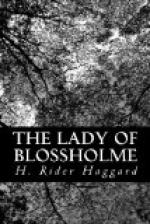Two hours had gone by. The Abbot sat in the little room of a cottage at Cranwell that he had occupied during the siege of the Towers. It was near midnight, yet, weary as he was, he could not rest; indeed, had the night been less foul and dark he would have spent the time in riding back to Blossholme. His heart was ill at ease. Things had gone well with him, it is true. Sir John Foterell was dead—slain by “outlawed men;” Sir Christopher Harflete was dead—did not his body lie in the neat-house yonder? Cicely, daughter of the one and wife to the other, was dead also, burned in the fire at the Towers, so that doubtless the precious gems and the wide lands he coveted would fall into his lap without further trouble. For, Cromwell being bribed, who would try to snatch them from the powerful Abbot of Blossholme, and had he not a title to them—of a sort?
And yet he was very ill at ease, for, as that voice had said—whose voice was it? he wondered, somehow it seemed familiar—the blood of these people lay on his head; and there came into his mind the text of Holy Writ which he had quoted to Christopher, that he who shed man’s blood by man should his blood be shed. Also, although he had paid the Vicar-General to back him, monks were in no great favour at the English Court, and if this story travelled there, as it might, for even the strengthless dead find friends, it was possible that questions would be asked, questions hard to answer. Before Heaven he could justify himself for all that he had done, but before King Henry, who would usurp the powers of the very Pope, if the truth should chance to reach the royal ear—ah! that was another matter.
The room was cold after the heat of that great fire; his Southern blood, which had been warm enough, grew chill; loneliness and depression took hold of him; he began to wonder how far in the eyes of God above the end justifies the means. He opened the door of the place, and holding on to it lest the rough, wintry gale should tear it from its frail hinges, shouted aloud for Brother Martin, one of his chaplains.
Presently Martin arrived, emerging from the cattleshed, a lantern in his hand—a tall, thin man, with perplexed and melancholy eyes, long nose, and a clever face—and, bowing, asked his superior’s pleasure.
“My pleasure, Brother,” answered the Abbot, “is that you shut the door and keep out the wind, for this accursed climate is killing me. Yes, make up the fire if you can, but the wood is too wet to burn; also it smokes. There, what did I tell you? If this goes on we shall be hams by to-morrow morning. Let it be, for, after all, we have seen enough of fires to-night, and sit down to a cup of wine—nay, I forgot, you drink but water—well, then, to a bite of bread and meat.”
“I thank you, my Lord Abbot,” answered Martin, “but I may not touch flesh; this is Friday.”
“Friday or no we have touched flesh—the flesh of men—up at the Towers yonder this night,” answered the Abbot, with an uneasy laugh. “Still, obey your conscience, Brother, and eat bread. Soon it will be midnight, and the meat can follow.”




